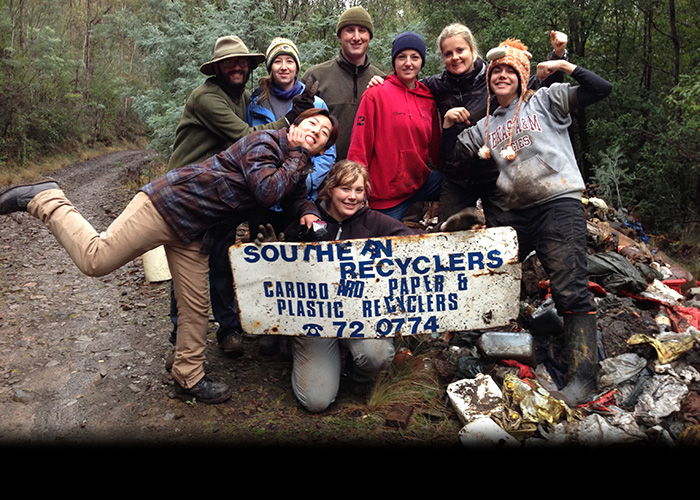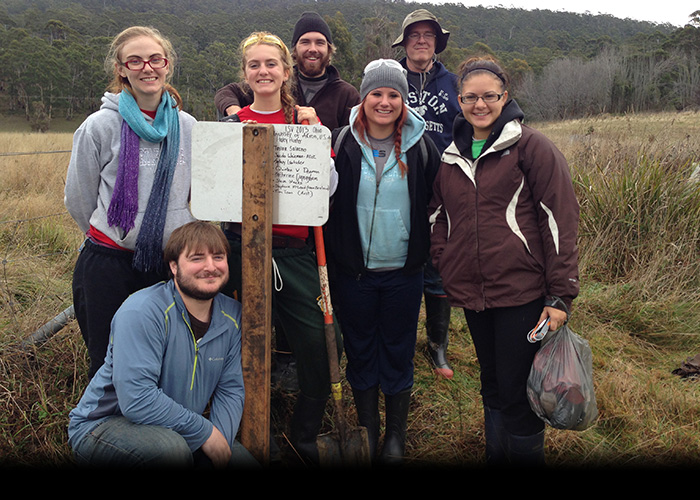TLC reserves get a helping hand from overseas

Our ISV team at Flat Rock Reserve - Front (L-R): Jerry (Canada), Mica (Canada) - Rear: Peter (USA), Culea (USA), Alex (USA), Marcy (USA) Stephanie (NZ-ISV Leader) and Laure (USA)
Every year for the past eight years the Tasmanian Land Conservancy has been lucky to partner with International Student Volunteers (ISV) to carry out essential, and sometimes very dirty, work on our permanent reserves.
This year throughout June and July our reserve management staff hosted two fabulous groups of university students from across the US and Canada, who tackled a range of land management activities on our Long Point, Flat Rock and Lutregala Marsh Reserves.
Our Reserves Officer, Tim Devereux, said that the students faced the hard work with smiles and good humour, all whilst braving a Tassie winter.
“They did a great job helping us where we most needed it. It’s not glamorous work, but it’s absolutely worthwhile. We followed up with our weed control plan at Long Point by tackling gorse control, and the 40 cubic metres of old rubbish we removed from Flat Rock was a proverbial weight lifted from the reserve,” he said.
“The program is obviously valuable to us in helping preserve these important ecosystems, but it’s also a really authentic way to introduce people from overseas to Tasmania and its unique people and places.”
Each group worked for two weeks over June and July, with groups visiting a mix of two of the three TLC reserves. But it wasn’t all work and no play, as they had a weekend each to get out into Hobart to experience Dark MoFo, the Festival of Voices and a range of activities the city was hosting at the time.
Alaskan native, Culea Abraham, was one of the enthusiastic student volunteers who participated in the June team at Flack Rock and Long Point Reserve, and she said the fulfilment they felt in a job well done was a great feeling.
“It was a lot of work. But when we looked back and saw a difference, the difference that we were making, we felt a sense of accomplishment; a sense that every little bit counts and we have the ability to change the world,” she said.
“Through the big area of cleared gorse and the loads of rubbish brought to the tip, we are on our way to having a better place to live.”

Akron University students at Lutregala Marsh - Front (L-R): Jacob. Middle: Kate, Sydney, Haley, Taylor. Back: Quinten, Dr Weeks.
One of the teams, hailing from Akron University in Iowa, USA, was joined by their professor Dr Stephen Weeks. Dr Weeks specialises in Evolutionary Invertebrate Ecology, and provided the opportunity for the science-based students to receive academic credit for their work on the reserves.
One of his students, Jacob Weizman-Alick, said that Tasmania’s parks, reserves and scenery were some of the most remarkable in the world, and that his time here had been an eye-opening experience.
“Coming from the United States, I found my jaw dropping around every corner as the mountains rise and sink on the horizon. As a part of the ISV I have had the privilege of helping several of Tasmania’s protected reserves by process of removing invasive plant species. Like warriors, we rode forth into battle each day against invaders like gorse, blackberry, Spanish heath and thistles,” he said.
“Experiencing the day-to-day of TLC employees and their struggle to maintain protected land reserves has left me with a resounding respect for the conservation community. I have seen a world I am not soon to forget. Most importantly, I have learned to never take this world for granted, because there is beauty unfathomable if you look for it.”
ISV is a world-wide not-for-profit organisation that gives university students the opportunity to volunteer on projects that enrich sustainable communities. They have been conducting their travel programs for almost 30 years for tens of thousands of students across six continents. These programs combine volunteering, education and adventure travel to create a fun rewarding experience.

